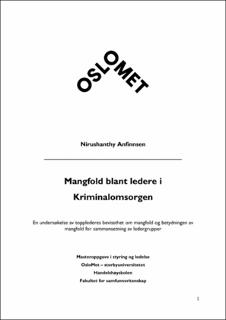| dc.description.abstract | This thesis takes a closer look at the topic of diversity amongst leaders in the Correctional service, with an overarching goal of identifying wether leaders in the correctional service are aware of the need for diversity, and if the awareness is present in the recruitment process.
Qualitative methodology has been used in the thesis and the data material is collected through interviews. The main focus of this paper is not a cause –and-effect view but rather to explore the interviewees consciousness regarding the topic.
By interviewing 8 leaders in the correctional service the thesis attemps to form a picture of the current situation in the correctional service. The informants have answered how they understand the term diversity, and also wich factors they believe promote and inhibit the recruitment of diversity when they themselves recruit leaders.
The results of the interview show that all of the informants want more diversity among the group of leaders in the correctional service, but the results also show that the awareness of the term is somewhat varied. There is little awareness of the depth of the concept of diversity, and the majority of informants only higlight gender and ethnicity as the main factors of diversity that the organisation needs to focus on. Despite the fact that everyone higlights the need for diversity amongst leaders, the overall results show that recruiting diversity is not something that is prioritized by the informants. Several informants refer to organizational obstacles as the reason for poor or non-existent recruitmen of diversity. Other informants indicate that there is no time to have a conscious and structured approach to this in everyday work life. Many of the informants, on the other hand, higlight risk as a factor that prevents the recruitment of diversity. Any hiring entails a risk, and by recruiting someone who is different from the majority entails a high risk. A risk the informants are not willing to take. It appears that the idea that «birds of a feather flock toghether» is the guiding principle.
Based on the data, it can appear that the fear of taking too great a risk contributes to an increased likelihood of homosocial reproduction when recruiting leaders. It appears that leaders use social similarity as a basis for selection within the organization. There are few female leaders and no leaders with a minority background in the correctional services. Wich means that the dominant group of the leaders are men. Lack of overall guidelines for recruitment combined with the fear of risk means that the likelihood of homosocial reproduction will stagnate the development of the correctional service. A homosocial reproduction in recruitment can result in the correctional service missing out on the positive benefits of a diverse group of leaders.
On the basis of the results, it may be recommended for the Norwegian Correctional Service to carry out a quantitative survey of the leaders in the organisation. In addition, it is recommended that KDI carry out an analysis of what leadership competence will be needed in the future. These two surveys will give the organisation a broader picture of the situation and thus form the basis for a recruitment strategy for leaders. In this ways the organisation can ensure that it fulfills the requirement from the goverment, but also that future leaders can contribute to better service from the organisation. By also ensuring more diversity among its leaders the organisation also contributes to representativness, wich in itself can contribute to the correctional service being able to recruit the best candidates. | en_US |
